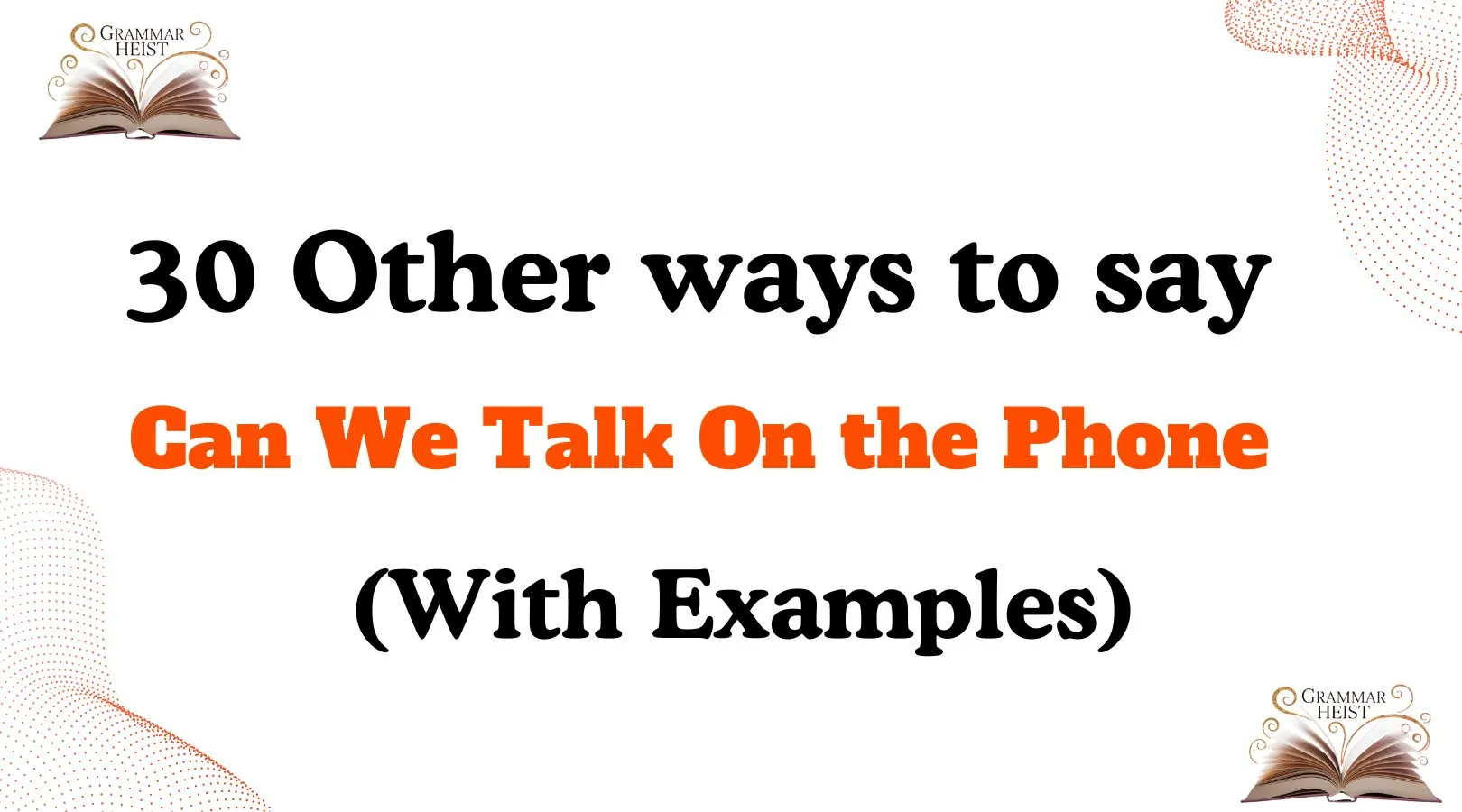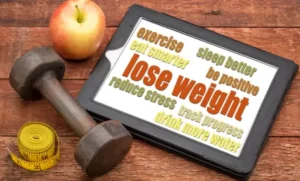When you’re trying to reach out to someone for a meaningful conversation, choosing the right words can make all the difference. It’s important to express your request for a phone call with warmth, care, and respect.
Sometimes the phrase “Can we talk on the phone?” feels a bit direct, and using more thoughtful alternatives can help create a more personal and approachable tone. Whether it’s a professional or casual conversation, here are 30 alternative ways to express the same idea while maintaining empathy and connection.
Is It Professional/Polite to Say “Can We Talk On the Phone?”
Yes, the phrase “Can we talk on the phone?” is polite and professional in most contexts. However, it can feel a bit direct or blunt depending on the situation. Using a softer, more thoughtful approach may be beneficial, especially if you are trying to build rapport or maintain an empathetic tone. Alternative ways to ask allow for more room to express care and respect for the other person’s time and feelings.
Pros or Cons of Saying “Can We Talk On the Phone?”
Pros:
- Clear and direct communication.
- Quick to convey your intent.
- Works well in professional settings where time is of the essence.
Cons:
- Can come off as abrupt or demanding.
- Lacks warmth or empathy, especially in personal settings.
- May put the other person on the spot if they’re not prepared for a phone conversation.
Synonyms For Can We Talk On the Phone
- Would You Have Time for a Quick Call?
- Could We Catch Up Over the Phone?
- Are You Free for a Quick Chat?
- Would You Be Open to a Phone Conversation?
- Can We Connect by Phone?
- Do You Mind If We Chat on the Phone?
- Would You Prefer to Discuss This Over the Phone?
- How About a Call?
- Can We Have a Word Over the Phone?
- Could We Schedule a Call?
- Is This Something We Can Discuss Over the Phone?
- I’d Love to Hear Your Thoughts Over the Phone.
- Can We Talk About This Over the Phone?
- Can We Speak on the Phone?
- Is It Okay to Give You a Call?
- Would You Mind Talking on the Phone?
- Let’s Hop on a Call!
- How About We Touch Base Over the Phone?
- Could We Have a Conversation on the Phone?
- Can We Touch Base via Phone?
- Are You Available for a Phone Chat?
- Shall We Speak on the Phone?
- Can I Call You to Talk About This?
- Are You Open to a Quick Call?
- Can I Reach You on the Phone?
- Do You Have Time for a Phone Call?
- Let’s Arrange a Phone Conversation.
- Would You Like to Chat Over the Phone?
- Can I Give You a Quick Call?
- Shall We Touch Base on the Phone?
1. Would You Have Time for a Quick Call?
Scenario: When you want to make sure the person has time for a call but you don’t want to demand their attention.
Examples:
- Would you have time for a quick call later today?
- If you have a moment, would you be up for a quick chat on the phone?
- Do you have a few minutes for a quick call this afternoon?
Tone: Casual, respectful, and considerate of the other person’s time.
Explanation: This alternative is polite and acknowledges that the other person may have a busy schedule, making it feel more like a suggestion than a request.
2. Could We Catch Up Over the Phone?
Scenario: Perfect for friends or colleagues you’ve lost touch with and want to reconnect.
Examples:
- Could we catch up over the phone this week?
- How about catching up on the phone sometime soon?
- I’d love to catch up over the phone if you’re free later.
Tone: Friendly, warm, and approachable.
Explanation: This phrase adds an element of connection and nostalgia, making it ideal for a casual or personal call.
3. Are You Free for a Quick Chat?
Scenario: When you want to check if the person is available before suggesting a call.
Examples:
- Are you free for a quick chat this evening?
- Would you be able to spare a few minutes for a chat later today?
- Can we have a quick chat on the phone when you’re free?
Tone: Polite, considerate, and light.
Explanation: By using “quick chat,” you make the conversation sound informal and easy, which can help set the right expectations.
4. Would You Be Open to a Phone Conversation?
Scenario: When you want to politely ask for a phone conversation, giving the other person space to agree.
Examples:
- Would you be open to a phone conversation sometime tomorrow?
- Are you open to a quick phone chat later today?
- Would you be willing to talk on the phone for a few minutes?
Tone: Respectful, polite, and considerate.
Explanation: This alternative emphasizes choice and autonomy, making the other person feel respected and not pressured.
5. Can We Connect by Phone?
Scenario: When you need to have a more serious conversation and want to convey a sense of importance.
Examples:
- Can we connect by phone about this?
- Can we talk by phone about this issue?
- I think we should connect by phone to discuss this further.
Tone: Direct, yet polite and professional.
Explanation: “Connect by phone” sounds professional and implies that the conversation holds importance.
6. Do You Mind If We Chat on the Phone?
Scenario: When you want to be extra considerate and ask for permission to call.
Examples:
- Do you mind if we chat on the phone later this evening?
- Would it be okay if we chatted on the phone tomorrow?
- Do you mind if we hop on a call to discuss this?
Tone: Very polite and thoughtful.
Explanation: This option is extremely polite and asks for the person’s consent, making them feel comfortable.
7. Would You Prefer to Discuss This Over the Phone?
Scenario: When you want to make sure the person is comfortable with discussing something over the phone.
Examples:
- Would you prefer to discuss this over the phone instead of over email?
- Would you prefer to talk on the phone about this?
- Would you feel more comfortable discussing this on the phone?
Tone: Respectful, accommodating.
Explanation: This alternative offers a choice and places importance on the other person’s comfort level.
8. How About a Call?
Scenario: A simple and casual way to suggest a phone conversation.
Examples:
- How about a call later to discuss the details?
- How about a call this afternoon?
- What do you think about having a call later today?
Tone: Casual, friendly.
Explanation: This is a straightforward and simple way to suggest a phone conversation without being too formal.
9. Can We Have a Word Over the Phone?
Scenario: When you want to convey that the conversation will be short but important.
Examples:
- Can we have a word over the phone?
- Do you have time to have a word over the phone?
- I just need to have a word with you on the phone.
Tone: Polite, but to the point.
Explanation: This suggests a brief conversation, making it sound less time-consuming and more like a quick discussion.
10. Could We Schedule a Call?
Scenario: When you’re looking to set a specific time for the phone conversation.
Examples:
- Could we schedule a call for tomorrow afternoon?
- When would be a good time to schedule a call?
- Can we schedule a call to discuss this matter?
Tone: Professional, organized.
Explanation: This suggests that you value the other person’s time and would like to plan accordingly.
Read More: 30 Other Ways to Say ‘I Wish You the Best’ (With Examples)
11. Is This Something We Can Discuss Over the Phone?
Scenario: When you want to clarify if a conversation would be more efficient by phone.
Examples:
- Is this something we can discuss over the phone, or would you prefer email?
- Is this something we should chat about on the phone?
- Would it be easier to talk about this over the phone?
Tone: Inquisitive, considerate.
Explanation: This alternative gives the other person a choice and helps them decide whether a phone call is necessary.
12. I’d Love to Hear Your Thoughts Over the Phone.
Scenario: When you want to hear the person’s opinion but feel a phone call would be a better medium.
Examples:
- I’d love to hear your thoughts over the phone if you’re free.
- Can we discuss this over the phone? I’d love to get your perspective.
- I’d love to chat on the phone to hear what you think about this.
Tone: Warm, open, and respectful.
Explanation: This approach expresses enthusiasm and interest in the other person’s thoughts, making them feel valued.
13. Can We Talk About This Over the Phone?
Scenario: When the conversation requires more in-depth discussion, and you want to make it clear.
Examples:
- Can we talk about this over the phone? I think it’s easier that way.
- Let’s talk about this over the phone later today.
- I think we should talk about this over the phone, it’ll be faster.
Tone: Clear, direct, and professional.
Explanation: This is a straightforward way to suggest a phone conversation when a topic requires clarity or further discussion.
14. Can We Speak on the Phone?
Scenario: A simple and professional request for a phone conversation.
Examples:
- Can we speak on the phone about the project?
- Would you be able to speak on the phone with me tomorrow?
- Can we speak on the phone to clarify a few things?
Tone: Direct but polite.
Explanation: This is a very neutral and formal request that works well in professional settings.
15. Is It Okay to Give You a Call?
Scenario: When you want to check if it’s convenient to call someone.
Examples:
- Is it okay to give you a call later today?
- Would it be alright if I gave you a call after lunch?
- Is it okay if I give you a quick call tomorrow?
Tone: Very polite and considerate.
Explanation: This phrasing ensures that you are asking for permission, which is respectful of the other person’s time.
16. Would You Mind Talking on the Phone?
Scenario: When you want to make sure the person is comfortable with a phone call.
Examples:
- Would you mind talking on the phone later?
- Would you mind if we discussed this over the phone?
- Would you mind having a conversation on the phone instead of texting?
Tone: Polite and empathetic.
Explanation: This phrase is empathetic, considering the person’s comfort before proceeding with the request.
17. Let’s Hop on a Call!
Scenario: A casual and friendly way to suggest a phone conversation.
Examples:
- Let’s hop on a call later today and talk about this.
- How about we hop on a call this afternoon?
- I think it would be easier if we hopped on a quick call.
Tone: Lighthearted and friendly.
Explanation: This alternative is fun and friendly, and works well when you want to keep things casual.
18. How About We Touch Base Over the Phone?
Scenario: When you want to discuss something quickly or clarify information.
Examples:
- How about we touch base over the phone to finalize the details?
- I think we should touch base over the phone about the project status.
- How about we touch base on a call to discuss the updates?
Tone: Professional, but friendly.
Explanation: This phrase implies a quick but important conversation, often in a business context.
19. Could We Have a Conversation on the Phone?
Scenario: When you want to make the phone call sound a bit more formal.
Examples:
- Could we have a conversation on the phone tomorrow morning?
- I think it would be helpful if we could have a conversation on the phone.
- Could we have a conversation on the phone to go over the details?
Tone: Formal, polite.
Explanation: This alternative is polite and works well when you need to approach the conversation more professionally.
20. Can We Touch Base via Phone?
Scenario: Ideal when you want to touch on a specific issue without a lengthy conversation.
Examples:
- Can we touch base via phone tomorrow?
- It would be great if we could touch base via phone to sort this out.
- Can we touch base via phone and discuss the next steps?
Tone: Efficient, professional.
Explanation: This alternative feels purposeful and implies a short and efficient conversation.
21. Are You Available for a Phone Chat?
Scenario: When you want to be more explicit about availability.
Examples:
- Are you available for a phone chat this afternoon?
- Can we arrange a phone chat sometime tomorrow?
- Would you be available for a brief phone chat?
Tone: Polite, considerate.
Explanation: This phrase asks for availability in a way that’s warm yet respectful of the other person’s schedule.
22. Shall We Speak on the Phone?
Scenario: A very formal way to request a phone conversation.
Examples:
- Shall we speak on the phone about this matter?
- Would you like to speak on the phone about the proposal?
- Shall we speak on the phone about how to proceed?
Tone: Formal, professional.
Explanation: This is a refined and polite way to ask someone for a conversation.
23. Can I Call You to Talk About This?
Scenario: When you’re ready to talk but want to ensure it’s okay to make the call.
Examples:
- Can I call you to talk about this in more detail?
- Would it be okay if I call you to discuss this further?
- Can I give you a call to talk about the next steps?
Tone: Direct, but polite.
Explanation: This is a straightforward yet respectful way of asking to call.
24. Are You Open to a Quick Call?
Scenario: When you’re proposing a brief phone conversation.
Examples:
- Are you open to a quick call later today?
- Would you be open to a short call to go over the details?
- Are you open to having a quick call this evening?
Tone: Casual, polite.
Explanation: This suggests the call will be brief, making it less of an imposition.
25. Can I Reach You on the Phone?
Scenario: When you want to ensure someone’s phone is the best way to get in touch.
Examples:
- Can I reach you on the phone about this?
- Is it okay if I reach you on the phone to clarify things?
- Can I reach you by phone later to discuss this?
Tone: Neutral, professional.
Explanation: This phrasing ensures that you are contacting the person in the right manner.
26. Do You Have Time for a Phone Call?
Scenario: When you want to check the person’s availability before making a call.
Examples:
- Do you have time for a phone call later today?
- When do you have time for a phone call?
- Do you have time for a quick phone call tomorrow?
Tone: Respectful, considerate.
Explanation: This approach is respectful of the person’s time, ensuring that you’re not interrupting.
27. Let’s Arrange a Phone Conversation.
Scenario: A formal way of suggesting a phone call with the purpose of scheduling it.
Examples:
- Let’s arrange a phone conversation for tomorrow afternoon.
- Shall we arrange a phone conversation about this issue?
- I think it would be best to arrange a phone conversation next week.
Tone: Formal, professional.
Explanation: This option is ideal for business or more formal contexts where scheduling a phone conversation is important.
28. Would You Like to Chat Over the Phone?
Scenario: When you want to make the request feel casual and open.
Examples:
- Would you like to chat over the phone later today?
- Would you like to chat over the phone about the project updates?
- Would you like to chat on the phone about this?
Tone: Warm, inviting.
Explanation: This phrasing feels inviting, friendly, and respectful.
29. Can I Give You a Quick Call?
Scenario: When you want to make sure the person knows the call will be brief.
Examples:
- Can I give you a quick call to clarify something?
- Can I give you a quick call this afternoon?
- Would you mind if I gave you a quick call to discuss this?
Tone: Friendly, considerate.
Explanation: This approach implies the conversation won’t take long, which can help the person feel comfortable accepting.
30. Shall We Touch Base on the Phone?
Scenario: When you want to refer to a brief, straightforward conversation.
Examples:
- Shall we touch base on the phone about the updates?
- Shall we touch base on the phone after the meeting?
- Let’s touch base on the phone tomorrow.
Tone: Professional, concise.
Explanation: This phrase is perfect for a brief, purposeful conversation.
Conclusion
Finding the right words to ask for a phone call can transform the way you communicate. Whether you’re in a professional setting or chatting with a friend, choosing thoughtful phrasing helps convey respect for the other person’s time and needs. Next time you need to ask, try one of these alternatives to make your request feel more personal and meaningful.

Emma Brooke is a passionate advocate for effective communication and language mastery. As a dedicated professional in the field of grammar and writing, Emma brings a wealth of knowledge and expertise to those seeking to improve their linguistic skills. With a focus on clarity, precision, and style, Emma Brooke is committed to helping individuals refine their language use to communicate confidently and effectively.












